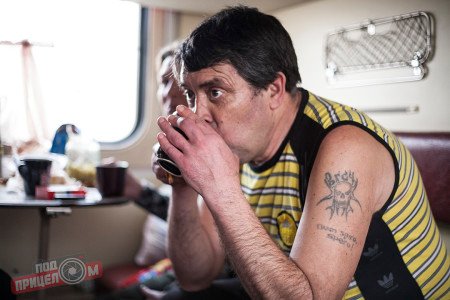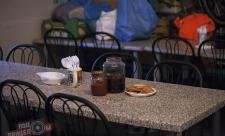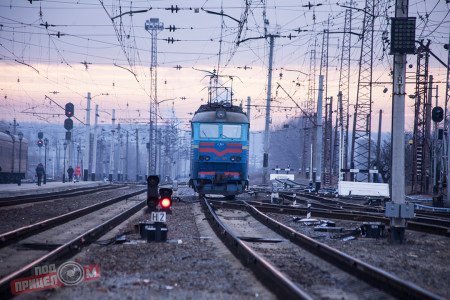 Our train from Kiev arrives to the half-empty train station of Slovyansk at half past 7 in the morning. People unhurriedly get out of the carriages: mostly these are elder women with the fabled plaid bags. Packs of dogs, which are chased by employees of the station from time to time, run along the tracks.
Our train from Kiev arrives to the half-empty train station of Slovyansk at half past 7 in the morning. People unhurriedly get out of the carriages: mostly these are elder women with the fabled plaid bags. Packs of dogs, which are chased by employees of the station from time to time, run along the tracks.
The railway station in Slovyansk accepts three-four trains a day, all the rest are suburban trains, on which, by the way, there isn’t much demand. A little bit further from the platform #3 there are quite new but rather dirty carriages of the train from Donetsk to Moscow standing there without any motion for about 2 weeks. There is a temporary refuge for the migrants from Debaltseve and Gorlovka, which were brought out by volunteers from the cities, which have been captured by rebels there. About 35 people live in the carriage right now.
“Listen, bro, do you have a cigarette?” a young man aged 25 asks Pavel, our guide.
“I don’t smoke,” he answers.
Pavel is a volunteer from the Church of “Good News” in Slovyansk, which in association with the Ministry of Emergency Situations aids refugees from Debaltseve, Gorlovka, Artemovsk and other towns of the region. They help with accommodation and provide the necessary medicine and food.
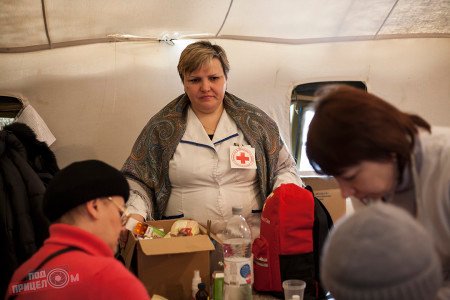 “There were very many people at the beginning,” the volunteer says while we are going along the train station. “2700 people passed through our hands within two weeks, 500 people departed each day. Nowadays there is only one carriage left. Everyone who wanted to leave – left, and here there are only the ones who don’t have anywhere to go.
“There were very many people at the beginning,” the volunteer says while we are going along the train station. “2700 people passed through our hands within two weeks, 500 people departed each day. Nowadays there is only one carriage left. Everyone who wanted to leave – left, and here there are only the ones who don’t have anywhere to go.
“How is your health?” Pavel asks a middle-aged man, when we get up into the carriage.
“It’s great. I check my blood pleasure. It looped down right now. Now I am going to live without problems for a month, then we will see,” the man of some 55 years with tired but burning eyes answers him.
“Do the pills help you?” the volunteer wonders.
“I have been using them for a year now. Sure, they help!”
The migrants live in usual open-plan carriages. There are neither mattresses nor bed sheets. They said that recently all of those have been taken away and they didn’t say when they would bring them back. It is relatively warm in the carriage. The conductor maintains the above-zero temperature. There is mostly food on the tables. Our interlocutors have tinned foods, cookies and tea lying on the table. And a small icon put in the edging of the window.
“Ten bucks”
“Honestly speaking, I didn’t want to leave,” Sasha, who is a man wearing sport pants and sleeveless sport shirt with yellow stripes, a worker of Fashchevskaya mine, says. “I am a mine-rescue man. All my life I have been afraid I was going to be buried alive in a “shelter”, who would dig me out then? And when Grad rockets “fell under my windows”, neighbors grabbed me and put me into a bus – I can barely walk. When some foreign reporters came to me (they wanted to film how I get up to the carriage with my cane), I told them: “Ten bucks”. Well, isn’t it Europe we are going to?
“Did you get a chance to take anything with you?” I asked Sasha.
“Passport, socks and a t-shirt – all in one small bag. It is funny, as all the other belongings have been packed in bags and left next to the door. It is just great. Now the doors are going to be opened by some “guests” and everything is waiting for him already packed. It will be possible to take everything away without any problems.
Sasha gets interrupted by Anna, his neighbor from Debaltseve. Anna is about 40 years old and lives in the carriage already more than two weeks. Despite the conditions of living, the migrant has a nice hairdo and make-up.
“A woman should always stay beautiful,” she answers me and laughs. “I have a flat in Debaltsevo, in the Eastern (a neighborhood – author’s note) and as for yesterday everything was in one piece except windows, doors fell out but at least walls were still standing. I came here with guys from the Ministry of Emergency Situations from Debaltseve. They distributed the humanitarian aid there and so I just fell in.
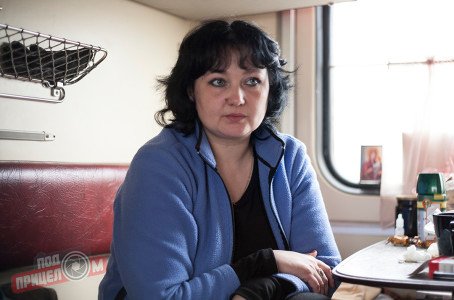
Anya, Debaltseve
Anna used to work in a poultry farm in Chernukhino. During the evacuation, her mother has been taken to Alchevsk and now the woman wants to return to fetch her mother and start going to work.
“My mother is from Chernukhino. Debaltsevo was mostly part of Ukraine, but all that other side was controlled by the “LNR”. So when battles for Chernukhino started, our people from Chernukhino got out and literary walked over dead bodies. People were picked up either on armoured vehicles or tanks, my mother was picked up by a car and taken to Alchevsk. Now I want to go and take her out of there – I can not leave her,” Anna says, brewing up tea from a used tea bag.
The woman proposes us to eat, and I ask her whether she wants to return home?
“Of course, I would like to return. Because these authorities have already entrenched – let there be at least any authorities. Now it does not matter anymore, as long as there is no gunfire,” Anya says almost crying. “At least, when the Ukrainian army was in Debaltseve, we didn’t starve: they gave us food and water. All the people were given tinned meat and cured pork fat. They are very generous and kind people, but when it comes to war, then it is already another matter. I lived in Debaltseve all those 7 months and there was no marauding, they didn’t do anything bad. I would pass through their block-posts everyday on my way to work and they would even give me a ride by car. There is nothing bad I can say here.
69 years old Nikolaich, an elder man wearing a warm black sweater and white sneakers with plastic silver toes, joins to the conversation.
“I was carrying a present for my sister when they (the Ukrainian Army, – author’s note) captured me, tight my hands and eyes and brought me to Kozlyatchiy (a pond in Debaltsevo, – author’s note). They broke my ribs.
“Don’t tell such passionate stories, Nikolaich,” Anna interrupts him. “They are the same either there or here.”
“They brought me. A commander came out and started cursing at once: “Whom did you bring?” he cried. “He is an old man of 69.” So, they let me out,” the old man summarized.
The migrants say that volunteers from the “Good News” always visit them and help them with medicines. Besides that, usual people, who are the residents of Slovyansk and its neighborhoods, bring them food and clothes. The employment center even offered them a job, but residents of the frozen train refuse. They say, they are not ready to stay in Slavyansk, they need to return home.
“Keep eating”
While we are talking with Anay and Sasha, an elder lady in a grey sweater sat silently in the corner. It is Tanya, she is from Gorlovka.
“It’s been the second day I can not read what is written here,” she says, holding a chocolate sweet.
“Kara-kum”, Anya replies her carefully.
Tatyana has poor eyesight.
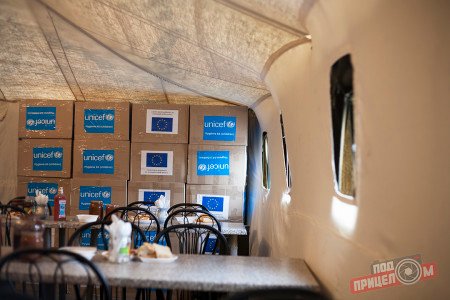 “I arrived on the 6th. Son stayed in Gorlovka (under control of the rebels): he didn’t want to get mobilized to the army and I left with volunteers. What was I doing without a dime? Live as you want. If Ukrainians gave food and humanitarian aid in Debaltsevo, then it was completely different in our place.”
“I arrived on the 6th. Son stayed in Gorlovka (under control of the rebels): he didn’t want to get mobilized to the army and I left with volunteers. What was I doing without a dime? Live as you want. If Ukrainians gave food and humanitarian aid in Debaltsevo, then it was completely different in our place.”
“In what way was it different?” I asked.
“In the way of hitting a head by the buttstock, this way,” Tanya answers me.
The woman speaks very slowly as if replying events of the past month in the head before she speaks about them.
“I wanted to receive some humanitarian aid in order to have something to come back with. However, I was not allowed – I don’t have any registration. It just happened to be so: I was busy processing inheritance, then my mother got sick and died, then the war came. My son asked me: “Where will you come?” And again… famine. There is food there in stores but there is no money. I wasn’t afraid of firing, explosions. But the famine… When I arrived here and came inside the tent with food, I cried. I thought I would never eat fill. And they tease me here,” she looks at Sasha, “they said: keep eating.”
Why is the carriage called Stolypin’s one?
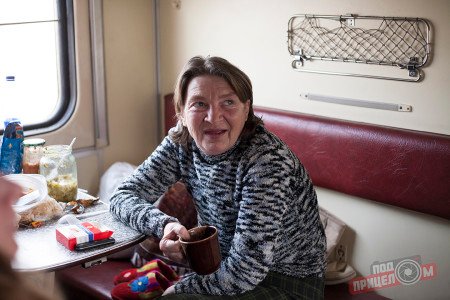 “The word “Stolypin’s” appeared when they used to transport “convicts” back during the tsarist rule.” Sasha tells us, walking us to the exit. “There was a minister Stolypin – he used to populate Siberia. Stolypins locos transported settlers, it was written on the carriages: “8 horses, 20 persons”. This is where the word “Stolypin’s carriage” came from, it also means hobo’s one. This is how we jokingly call our carriage,” he summarizes.
“The word “Stolypin’s” appeared when they used to transport “convicts” back during the tsarist rule.” Sasha tells us, walking us to the exit. “There was a minister Stolypin – he used to populate Siberia. Stolypins locos transported settlers, it was written on the carriages: “8 horses, 20 persons”. This is where the word “Stolypin’s carriage” came from, it also means hobo’s one. This is how we jokingly call our carriage,” he summarizes.
Sasha lights up and tells us goodbye. We wish him to return home soon, but he laughs in response and says: “Main thing I regret about is the sneakers. I had the “brand-name” Adidas. I burnt them when it was cold.”
According to the Ministry of Emergency Situations, over 40 thousand of settlers registered in Sloyansk and Svyatogorsk. There are two tents mounted in the train station – it is possible to have something to eat in the first one, and find something to wear in the second one. Besides that, settlers’ registry point operates in the train station, where volunteers of the employment center offer jobs in the region.
Author of the photos: Emma Soldatova





